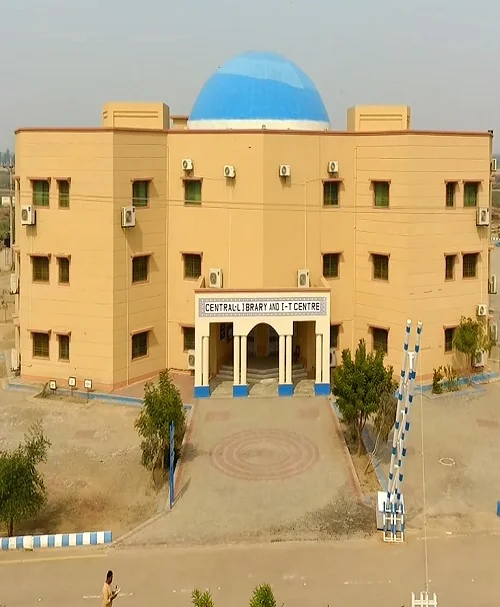Introduction
The Office of the Director of Student Affairs at a medical university typically plays a crucial role in supporting and enhancing the student experience. This office is dedicated to addressing the diverse needs of medical students, ensuring their well-being, academic success, and professional development. Below are some key functions and services usually offered by such an office
1. Student Support and Counseling:
• Provides mental health services, including counseling and therapy sessions. :
• Offers academic advising and support to help students manage their coursework and exam preparation.
• Assists with personal issues that may affect students' academic performance and well-being.
2. Career Services:
• Offers career counseling and guidance for medical students.
• Organizes workshops, seminars, and networking events to help students with residency applications and job placements.
• Provides resources and advice for career planning and professional development. :
:
3. Student Organizations and Activities:
• Supports and oversees various student organizations, clubs, and societies.
• Coordinates extracurricular activities, events, and leadership programs.
• Promotes student engagement and community involvement.
4. Health and Wellness Programs:
• Develops and implements health promotion and wellness programs.
• Provides resources for stress management, physical health, and healthy lifestyle choices.
• Organizes fitness and recreational activities.
5. Academic Affairs:
• Works closely with faculty to address academic concerns and improve the educational environment.
• Manages academic records and ensures compliance with academic policies.
• Coordinates tutoring and mentoring programs.
6. Financial Aid and Scholarships:
• Administers financial aid programs, including loans, grants, and scholarships.
• Provides financial counseling and budgeting assistance to students.
• Assists with the application process for various financial aid resources.
7. Diversity and Inclusion Initiatives:
• Promotes a diverse and inclusive campus environment.
• Develops programs and initiatives to support underrepresented groups.
• Addresses issues related to discrimination and harassment.
8. Orientation and Transition Programs:
• Organizes orientation programs for new students to help them acclimate to the university environment.
• Provides resources and support for students transitioning between different phases of their medical education.
9. Alumni Relations:
• Maintains connections with alumni and organizes events to engage them with current students.
• Facilitates mentorship opportunities between alumni and students.
• Supports alumni networking and career development.
10. Communication and Information Dissemination:
• Keeps students informed about important deadlines, events, and opportunities.
• Manages communication channels, including newsletters, social media, and the university website.
• Provides a platform for students to voice their concerns and suggestions.
Overall, the Office of the Director of Student Affairs is integral to creating a supportive and enriching environment for medical students, helping them navigate the challenges of medical education and achieve their professional goals.
1. Student Support and Counseling:
• Provides mental health services, including counseling and therapy sessions. :
• Offers academic advising and support to help students manage their coursework and exam preparation.
• Assists with personal issues that may affect students' academic performance and well-being.
2. Career Services:
• Offers career counseling and guidance for medical students.
• Organizes workshops, seminars, and networking events to help students with residency applications and job placements.
• Provides resources and advice for career planning and professional development. :
:
3. Student Organizations and Activities:
• Supports and oversees various student organizations, clubs, and societies.
• Coordinates extracurricular activities, events, and leadership programs.
• Promotes student engagement and community involvement.
4. Health and Wellness Programs:
• Develops and implements health promotion and wellness programs.
• Provides resources for stress management, physical health, and healthy lifestyle choices.
• Organizes fitness and recreational activities.
5. Academic Affairs:
• Works closely with faculty to address academic concerns and improve the educational environment.
• Manages academic records and ensures compliance with academic policies.
• Coordinates tutoring and mentoring programs.
6. Financial Aid and Scholarships:
• Administers financial aid programs, including loans, grants, and scholarships.
• Provides financial counseling and budgeting assistance to students.
• Assists with the application process for various financial aid resources.
7. Diversity and Inclusion Initiatives:
• Promotes a diverse and inclusive campus environment.
• Develops programs and initiatives to support underrepresented groups.
• Addresses issues related to discrimination and harassment.
8. Orientation and Transition Programs:
• Organizes orientation programs for new students to help them acclimate to the university environment.
• Provides resources and support for students transitioning between different phases of their medical education.
9. Alumni Relations:
• Maintains connections with alumni and organizes events to engage them with current students.
• Facilitates mentorship opportunities between alumni and students.
• Supports alumni networking and career development.
10. Communication and Information Dissemination:
• Keeps students informed about important deadlines, events, and opportunities.
• Manages communication channels, including newsletters, social media, and the university website.
• Provides a platform for students to voice their concerns and suggestions.
Overall, the Office of the Director of Student Affairs is integral to creating a supportive and enriching environment for medical students, helping them navigate the challenges of medical education and achieve their professional goals.






